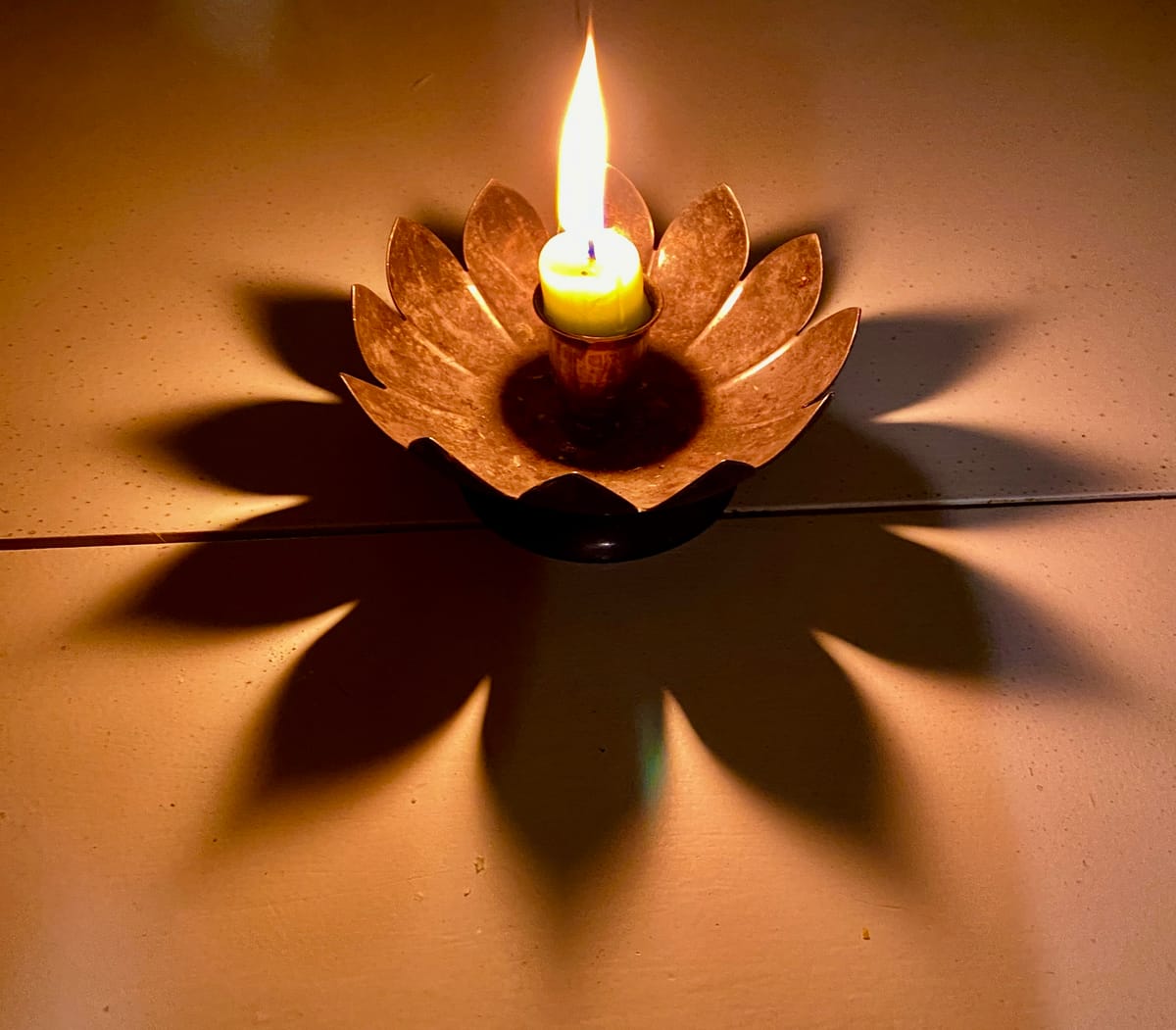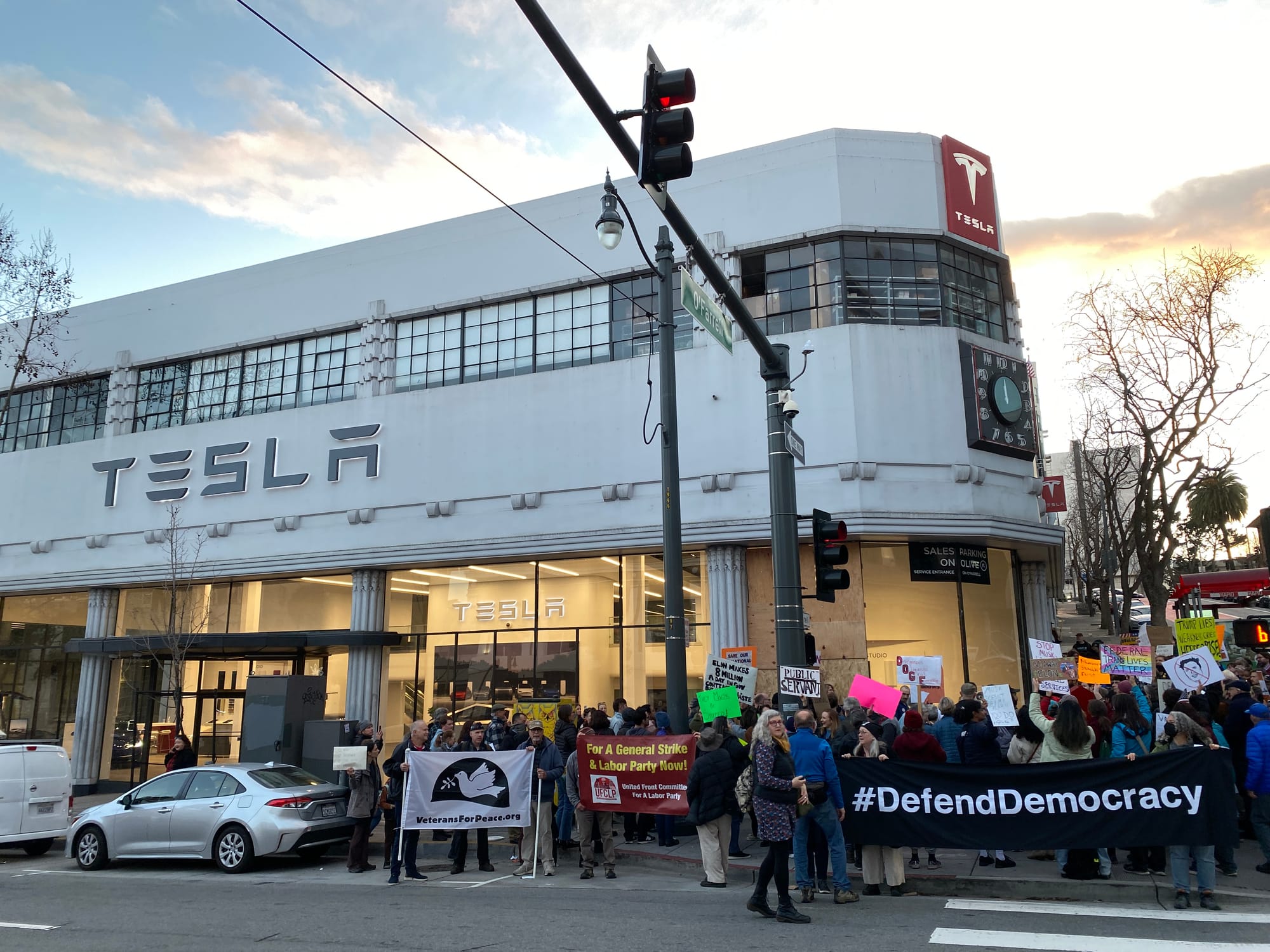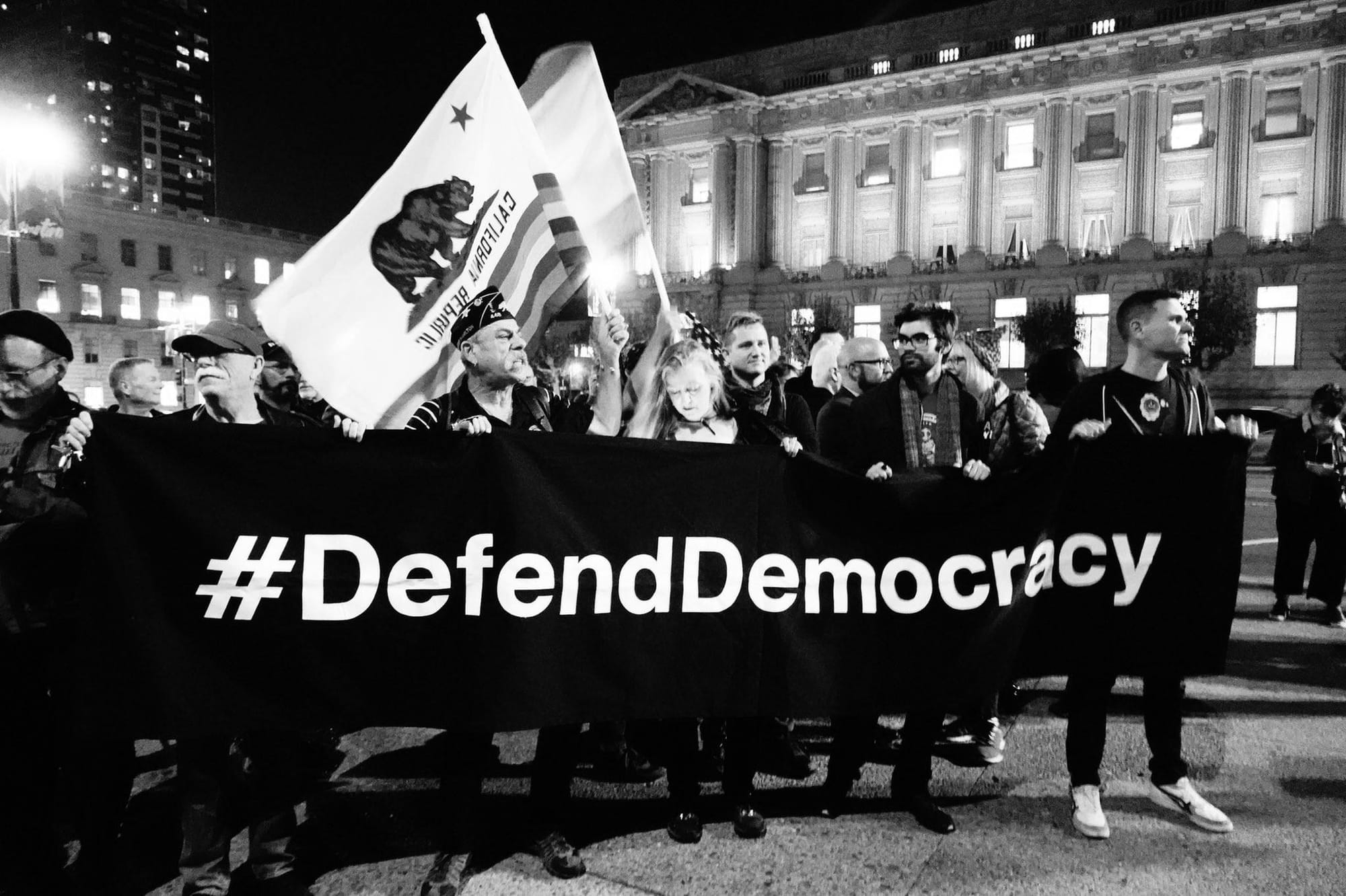THIS IS REALLY HARD (BUT WE ARE NOT QUITTING): REFLECTIONS ON KINDNESS AND RESOLUTENESS

If you're reading this, you got through the first month of the assault on everything, none of it a surprise except in how stupid and ruthless the sabotage was, but a lot of its shocking, also because of how stupid and ruthless and full of petty vengefulness it was. (Yes, there was an Executive Order to end "the forced use of paper straws.") For me, not despite but because of everything going on, there was also kindness, so much kindness, kindness from acquaintances and strangers, this week.
Yesterday, while driving around town on errands, I encountered a delivery guy trotting across the middle of the street back to his truck, and I stopped for him and waved him through and he waved back and beamed and gestured with big gratitude and then waved at the driver in the car going the other way who had also waved him on. In the most fleeting and minor way, the three of us were being a good cooperative society in the middle of 18th Street just b Castro Street. (Part of why I'm grumpy about driverless cars is because I believe driving is a social activity in which the ability to communicate and read communications like all those hand gestures and all that body language and that smile is important.)
When I got to Cliff's Variety on Castro Street, the staffperson over by the pots and pans and cookie cutters asked me what I was looking for, and it turned into a whole conversation about the state of things, the Tesla protest on Wednesday, how we were doing under the barrage. It was like I'd gone to church for spiritual support, even though I'd just gone to Cliff's for an extension cord and a rainbow flag. I was really feeling weighed down by all the terrible stuff going on, and yeah, I had spent the morning more or less doomscrolling, even though, as you know, I always look for light and handholds even in the abyss. The abyss right now is really deep and full of monsters--the confirmation of Kash Patel for the FBI, the abandonment of Ukraine--you know the list.
But if you don't know Cliff's, it's the 89-year-old hardware store in the heart of the Castro neighborhood here in San Francisco. It's a superlative version of a hardware store, staffed by the most wonderful people, and the annex with housewares and sewing supplies also has an excellent selection of festive masks and sparkly brooches and tiaras. Where else can you buy both drill bits and rhinestones, and isn't the place that lets you be both diva and handyperson paradise itself? My ad-hoc pastor in the kitchenwares aisle gave me reassurance and solidarity and we bantered a bit and showed each other pictures of the protest in front of the Tesla salesroom the night before.
People were amazing at that protest called for and by federal workers in front of Tesla in central San Francisco. It felt like maybe one out of every four cars driving down wide Van Ness Avenue honked, and nearly every MUNI bus driver sent off a flurry of deep honks, and people driving by shouted and pumped their fists. The crowd was lovely and sweet and maybe not as loud and energized as some I've been around, but they were there, there to support federal workers and oppose the coup and its leaders, and that's what counted in the moment. And some of them were federal workers. No cops in sight, no pedestrians grumpy about the crowded sidewalks.

Then I caught a MUNI bus home, and my transit card didn't have enough value on it to do the electronic fare thing, so a scruffy guy offered me change for a five and the bus driver waved off my one-dollar bills and produced a pass for me, and then I fell to talking to the Black teenager who'd just had an argument with his friend before the friend got off the bus. Before I got off myself, I took took his hand--such a soft young hand--and wished him well, and he replied in kind.
Everywhere I went it felt like people were trying harder than usual to show up, to connect, to be their best selves. This is emergency behavior. This is how people behave when their city is bombed or flooded or burning down, this extra care, this extra presentness, this best self connecting with other best selves. Then, online, an actual pastor I knew reminded me that the word comfort means to fortify (com- as in with; fort as in fortress, fortitude, and fortify), maybe to fortify with kindness. We were fortifying each other with what we had to offer, which was ourselves, by really being with each other.
I got through most of the first month of the assault on almost everything with what was maybe a hypervigilant surge of something or other--cortisol? adrenalin?--not anger but a fierce protectiveness and a sense of strength. That strength flagged yesterday, just because I was tired, and just because--well what is that feeling we have when we see so much and so many being destroyed, devalued, disparaged? At what intersection do grief, horror, sadness, outrage, and exhaustion meet?
I slept better last night so I have more momentum, but not less sadness. I am and we are witnesses to a catastrophe, a cruel and stupid catastrophe, a breaking of things--domestic institutions, international alliances– that took decades to build, a country that has been pretty stable for 249 years, definitely a climate that has lasted 100,000 years in its current phase before climate change destabilized it, species that have lasted millions of years. The destruction is at the intersection of hideous and heartbreaking.
I want to say that we are in a culture that often seems to insist that our first job is to be happy, and that anything else or less is a failure, and I'm all for whatever moments of joy, repose, and encouragement we can find or make or offer in this hideous crisis, but also it's okay to be sad. That sadness is a sign of care--and one of the striking things about this crisis that's also encouraging is how much people care (and a writer reminded me a while back that encourage literally means to instill courage). The sadness is a measure of that--"it hurts exactly as much as it's worth," the novelist Zadie Smith once wrote, quoting another novelist about loss and grief.
We are feeling what all this stuff under attack is worth to us. My worst fear around the great public threats is that people will be indifferent, will be bought into the idea that whatever doesn't affect them in the most immediate and direct way doesn't affect them at all or isn't reason for care or isn't their job to do something about. Or that they will feel powerless and surrender prematurely, and there is so much that tells us--wrongly--that we have no power. We are still figuring out what we can do about it, but that care is foundational.
It's one face of idealism and of an authentic sense of being a member of society, of a commitment and valuation of the systems that add up to a society and a country, of the way we have taken care of our natural world and each other through federal programs supported by our taxes (the right-wing hatred of taxes is mostly about selfishness and a denial both that they're part of these systems of public good that give them safe drinking water and national parks and that they care about them). There's a cynical version of human nature in which we're deeply selfish and only care about our self-interest defined narrowly; politicians often pander to us as though this is who we are, but across the spectrum people are ideologues, whether or not you like their ideology. And selfishness is an ideology, in service of which people vote against their immediate self-interest (there's a book about that called Dying of Whiteness). The people wreaking all this destruction are betting on us being self-interested, not idealistic, fearful not rebellious, and I hope we'll prove it was a bad bet.
Americans are getting a crash course in what the federal government does and how it intertwines with their lives. While there's lots of awful things the government does, from middle-east policy to propping up the oil industry, there's also Head Start and Medicare and scientific research and public lands management and mail delivery. We are seeing the best of federal workers--their devotion to their work and solidarity with their coworkers, their idealism when they're heading programs that increase knowledge or safety or health or protect nature--and also seeing them suffer the sabotage of their careers and their livelihoods. So many stories of so many wrecked lives are surfacing.
But sadness won't stop me, and to say I'm sad is to describe how I feel, not what I think. I've long said in regard to climate, that I respect despair as an emotion, but not as an analysis. Not only are Americans, on the one hand, urged to be eternally impossibly happy, as in free from all care and anxiety, but on the other hand--or from some other camps--we're encouraged to regard anger as incredibly useful. Sometimes the manifestation of anger is treated as the right sign of care, and displaying that rage as the work itself, as if you just wanted to be the right kind of person exhibiting the right feelings for the right audience (and social media is very good at encouraging this performativeness). But the job is to do the job, I believe– to address and try to change what you're angry about, if you're angry. Or if you're not. You can do that work whatever you feel.
The job isn't to be happy, sad, angry, unfeeling, or anything else; it's to do the work to oppose this destruction. But taking care of yourself so you don't fall apart or wear out or aggravate your allies too much is how you stay capable of doing it. One thing I find useful is the distinction between feelings and commitments--you can feel despair or grief or exhaustion and not let go of your commitments or principles. Emotions are the weather that swirls around and changes and changes again. Commitments, principles, are the mountain on which the sun and the rainstorm fall, and it remains a mountain. Pay attention to your storms and rays of light and pay attention to the mountain on which all those things fall.
And one more etymology: the word kind is related to kin, as in kinship, family. Isn't kindness a recognition of kinship, fellowship, connection? I believe the damage is being done by people whose profound unkindness comes from disconnection (watching a zonked-out, incoherent Elon Musk onstage at CPAC last night, widely assumed to be high as a kite on ketamine, is a reminder that they're disconnected even from themselves). Kindness is seen as a weakness, but it's a strength, both in its ability to care for other and in its recognition of the ways we're all connected. I wish you the fortress in comfort, the kinship in kindness, and the courage in encouragement, in both what you give and what you receive.
p.s. A bit of nice news: the wonderful organizers and volunteers I work with have launched the Resist List, a list of all the forms of resistance planned and going on (well some of them, and bear with us, we're just getting started). You can find it on BlueSky at https://bsky.app/profile/resistlist.bsky.social and we'll be adding more social media platforms soon. Oh and it's hosted at a site you may find otherwise useful for understanding our powers and possibilities in this crisis: https://choosedemocracy.us.
p.p.s. In the emailed version of this, I failed to see a bunch of notes/drafts/scraps at the bottom of the piece! Since deleted, but also: yikes! I'm on the fence about enlisting a proofreader--it slows down putting these essays out, but it also tidies them up.




